on all orders over $100
on all orders over $100
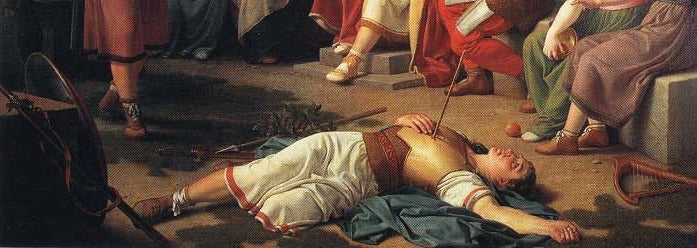
In Norse Mythology Baldur was said to be the most beloved of all the Gods. He was the son of Odin and Frigg and had numerous siblings. Hodr was his only brother, however he also had several half brothers including prominent Norse Gods such as Thor, Vali and an adopted brother, Loki.
Baldur's wife was named Nanna, with whom he fathered a child by the name of Foresti, who was a noble God often associated with justice and peace. He would often help bitter enemies settle their grievances in a peaceful manner in his hall known as Glitnir.
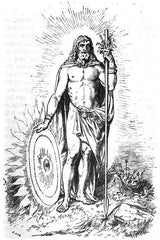
Baldur - Johannes Gurts, 1901
He was a member of the Aesir, who were the largest and most important tribe, and lived in Asgard. Baldur was described as being extremely handsome and personable, in some accounts he was said to have been actually radiating light. He would often help both Gods and men to settle disputes and was renowned for his fairness.
The name 'Baldur' also 'Baldr' in Old Norse and 'Balder' in Old English was thought to be derived from the Old English word 'Bealdor' which meant 'Lord', 'Prince', or 'King'. The word was also used in various other Germanic languages.
In Old Norse the word 'Baldr' literally translates to 'Bold', however many historians have been reluctant to accept this as the primary meaning due to the character of the God being so strongly associated with peacetime and the word 'Bold' often being associated with Gods of war.
One of the central and most important stories in Norse Mythology 'The death of Baldur' features in both the Prose Edda and the Poetic Edda. In the Poetic Edda the story is referred to various times, but never really told in great detail, however in the Prose Edda we get a much more detailed and complete version of events.
Amongst the Norsemen of the Viking age it was a common belief that dreams had great meaning, and could sometimes offer a glimpse into the future. When Baldur and his mother, Frigg, both had the same dream that foresaw his death they took it as an ominous sign.
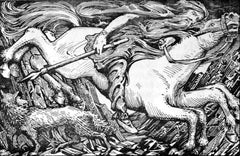
Odin rides to hell - W. G. Collingwood, 1908
Upon deciding that something needed to be done to protect their beloved son Frigg and Odin decided to seek the help of a völva, a practitioner of a dark type of norse magic known as seidr. Odin rode his eight legged horse, Sleipnir, to the realm of the dead in order to wake an ancient witch from the dead. The völva was displeased at being woken and resisted Odin's interrogation, however after some persistence he learned that Baldur was indeed destined to die, the witch just did not specify by what means his death would come about.
When Odin returned and gave the devastating news to Frigg she was reluctant to accept it, and went about planning of ways to subvert her sons fate. She travelled throughout the nine realms and made each and every living being swear a magical oath which prevented them from being able to do any harm to Baldur.
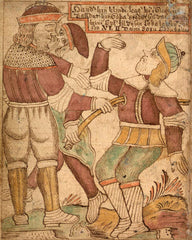
Baldur's Death - 18th Century Icelandic Manuscript
The other Gods were delighted that nothing could hurt their beloved Baldur, and they even began to test the spell to by throwing things at him, which bounced off without leaving a mark. Eventually the other Gods became curious and started to throw, spears, fire arrows and sling rocks at Baldur, however they all had no affect on him.
Jealous of his new powers and all the attention Baldur was receiving Loki decided that he would do something to sabotage him. In keeping with his mischievous reputation he devised a plan to dress up as a woman and trick Frigg into telling him Baldur's weakness. Frigg admitted that on her quest to ask all things not to harm her son she had forgotten one particular type of mistletoe plant which was found in the woods close to Asgard. She stated that this posed little threat to her son and was not of immediate importance.
Upon receiving this information Loki set out to find the mistletoe and fashioned a deadly spear from it. When he returned he handed the spear to Baldur's brother, Hodr, who was blind, and challenged him to throw the spear at Baldur. Being unaware of what he was throwing Hodr agreed and Loki guided his aim to allow him to hit the target.
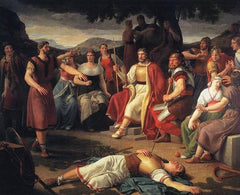
Baldur’s Death - Christoffer Wilhelm Eckersberg, 1817
Hodr threw the spear and all of the Gods gasped as it impaired Baldur and he fell to the ground. Odin rushed over to his son and whispered into his ear, what exactly he said remained one of the great mysteries in Norse literature.
The rest of the Aesir desperately tried everything they could to bring Baldur back, including riding to the underworld to plead with Hel to release him back into the realm of the living. After listening to their case she agreed to do so, but only on the condition that every living being in the nine realms would weep for Baldur at the same time. The Aesir sent out messengers to all of the realms, asking for their help, and all agreed.
All went for the fallen God, apart from one Jotun giantess named Thökk, who was actually thought to be Loki in disguise. Baldur was therefore not returned to the realm of the living and remained with Hel in the underworld. The gods were devastated and even killed Hodr for his part in Baldur's death.
If you enjoyed our article or have anything to add please leave a comment below.
Check out some of our handmade Viking Jewelry.
Leave a comment